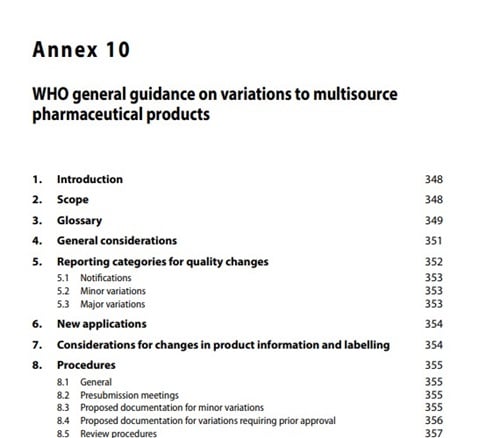TRS 966 - Annex 10: WHO general guidance on variations to multisource pharmaceutical products
Annex 10, WHO Technical Report Series 966, 2016
30 September 2016
| Technical document

Overview
A marketing authorization (MA) holder or applicant is responsible for the quality, safety and efficacy (QSE) of a finished pharmaceutical product (FPP) that is placed on the market, throughout its life cycle. After the FPP has been authorized for marketing, the manufacturer will often wish to make changes (variations) for a number of reasons, for example, to respond to technical and scientific progress, to improve the quality of the FPP, to apply updates to the retest period for the active pharmaceutical ingredient (API) or shelf life of the FPP, to meet market requirements such as for scale-up or additional manufacturing sites, or to update product information (e.g. the information on adverse reactions). Such changes, regardless of their nature, are referred to as variations and may require the approval of the national medicines regulatory authority (NMRA) prior to implementation. NMRAs and MA holders should recognize that: – any change to the manufacture of the API or the FPP may impact the QSE of that FPP; – any change to the information associated with the FPP (i.e. product labelling information) may have an impact on the safe and effective use of that FPP. This document is intended to serve as a guide for establishing national requirements for the regulation of post-approval changes. The proposed categories of changes and reporting procedures are provided in these guidelines. It is possible that modification of these principles may be justified in light of risk–benefit and legal considerations specific to each NMRA.
WHO Team
Access to Medicines and Health Products (MHP),
Health Product Policy and Standards (HPS),
Norms and Standards for Pharmaceuticals (NSP),
Technical Standards and Specifications (TSS)
Number of pages
12
